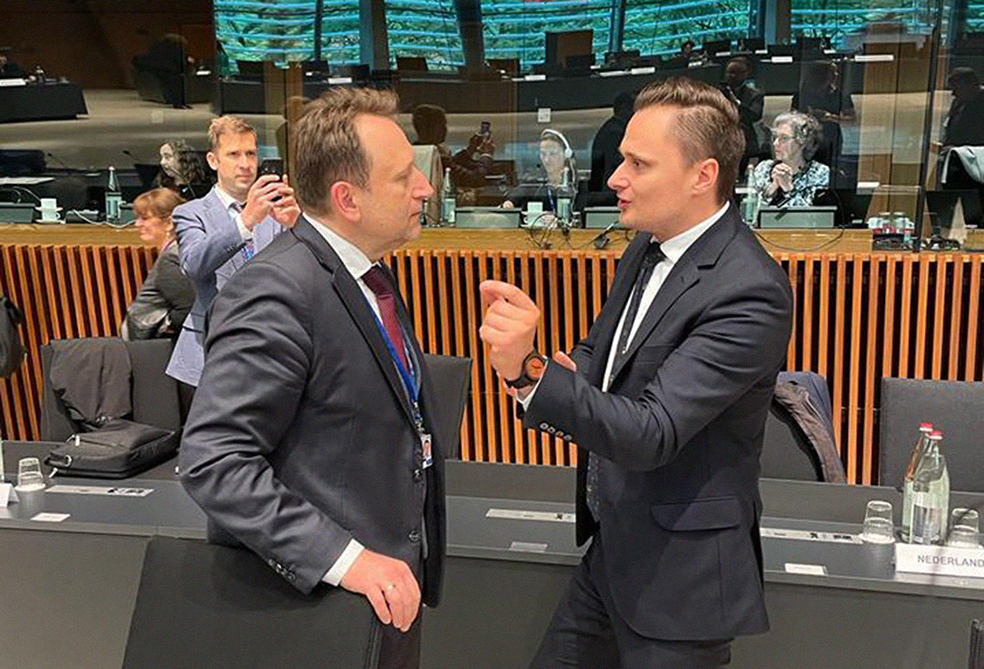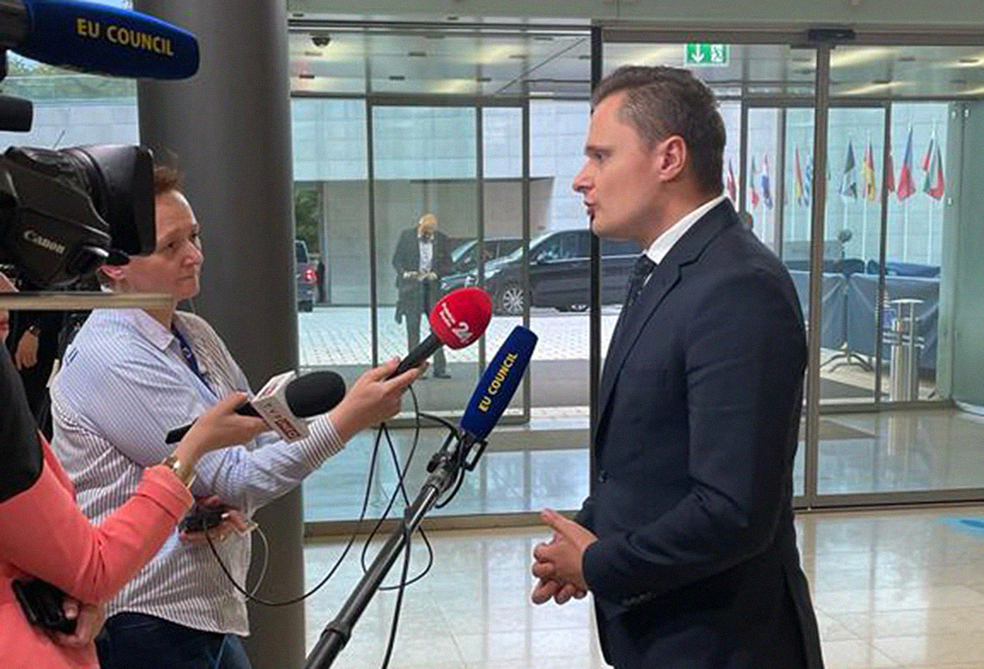Meeting of EU Ministers of Agriculture and Fisheries in Luxembourg
18.10.2022
Under-Secretary of State Krzysztof Ciecióra attended the EU Agriculture and Fisheries Council (AGRIFISH) meeting on 17 October 2022 in Luxembourg. The deliberations addressed both fisheries and agricultural issues.

The main topics of the meeting were the Council Regulation fixing the fishing opportunities for 2023 in the Baltic Sea, the situation on agricultural markets in their countries, particularly after the invasion of Ukraine, and agricultural issues related to trade.
Fisheries
The EU Ministers of Fisheries have reached a political compromise on catch quotas for 2023 in the Baltic Sea. Under the political agreement on the 2023 Baltic Sea fishing quotas, it has been agreed that the central herring quota will increase by 32% compared to 2022, while the sprat quota will amount to 224 114 tonnes and will be 22 560 tonnes higher than the EC's initial proposal. The plaice quota will increase by 25% to 11 313 tonnes, and the remaining quotas for other fish species will remain unchanged in 2023.
During the debate, the Baltic States indicated that managing fish stocks in the Baltic Sea was challenging. That was as improving the condition of fish stocks is not solely dependent on fisheries decisions but has a much broader dimension that necessitates holistic action to remedy the current situation of the Baltic Sea.
The EU Member States stressed that the situation of both cod and western herring stocks remains remarkably poor and that all necessary steps must be taken to improve their condition. They considered that the protection of coastal fisheries is one of the essential elements of the Common Fisheries Policy and in the interest of the whole European Union. The Ministers also noted that one of the most critical elements of the Common Fisheries Policy is regionalisation, which allows for the development of shared solutions for the countries concerned. The effect of activities at the regional level is the Baltifsh common position regarding the Baltic Sea fish stocks.
Undersecretary of State Krzysztof Ciecióra said that the setting of total allowable catches should be done following the Common Fisheries Policy provisions and with the account taken of best available scientific knowledge, which is extremely important in the context of improving the situation of Baltic Sea fish stocks. It is Also, it is necessary to consider socio-economic aspects when deciding on the shape of fishing opportunities for 2023. Deputy Minister Ciecióra further pointed to the irresponsible actions of Russia violating all international agreements, both in the context of protecting the resources and the environment in the Baltic Sea, thus significantly contributing to the degradation of the fragile ecosystem of the Baltic Sea.
The situation in the markets, particularly after the invasion of Ukraine
The Ministers exchanged information on the situation in agricultural markets in their countries, especially in the context of the Russian war against Ukraine. They stressed the importance of solidarity and support for Ukraine, especially the continuation of exports from the country, including through solidarity corridors. Moreover, they highlighted the significant increase in input prices and the availability of fertilisers as factors affecting production and producers in all sectors. The many Member States emphasised the need to extend the temporary emergency framework for state aid.
The EC assured that it was monitoring agricultural markets, especially susceptible ones such as the apple market in Poland. It also mentioned the problematic situation in the livestock sector and added that it had proposed extending the temporary state aid framework, which would allow flexible support for the agricultural sector.
The EC also referred to the situation in Ukraine, stressing the need to continue supporting its efforts to secure agricultural exports, including the need to extend the agreement on the Black Sea ports.
It pointed to the problems faced by EU farmers due to high production costs, energy prices, rapid inflation, and weather conditions. As for fertilisers, the EC drew attention to rising prices and possible availability problems. It announced that the communication on fertilisers should be issued on 9 November this year. It will outline possible ways for the fertiliser industry to become less dependent on external factors and methods for supporting farmers and the fertiliser sector, including by the states.
Undersecretary of State Krzysztof Ciecióra informed that Poland had implemented emergency adjustment aid for pig producers and dessert apple producers, and the reduction in the pig population due to the lack of profitability of production continued.
"The situation on the dessert apple market is still complicated. Rising electricity costs are prompting faster sales of apples, and a shortage of seasonal workers could limit this year's harvest," the Deputy Minister said.
The Deputy Head of the Ministry of Agriculture stressed that further derogations from specific requirements in the direct payment system, analogous to those for 2022 and 2023, could play an essential role in stabilising the market situation and ensuring food security.
He reported that, under the Temporary Crisis Framework for State Aid, Poland had developed a EUR 836 million aid programme to subsidise farmers' purchase of mineral fertilisers. He assessed that the functioning of the Temporary Crisis Framework for State Aid should be extended.
Deputy Minister Ciecióra added that the EU policy on renewable energy sources should be revised and the rules for local use of biomass simplified.
The Undersecretary of State recalled that Poland remained an essential link in supporting Ukraine in exporting agricultural products.
"However, we count on the European Commission's greater involvement and tangible assistance regarding solidarity corridors," the Deputy Minister stated.
The Deputy Head of the Ministry of Agriculture noted that the Russian invasion of Ukraine had exacerbated the problem of rising production costs and insufficient supply of mineral fertilisers. He informed that, in Poland's view, the measures taken at the national level under the Temporary Crisis Framework for State Aid were insufficient and required support at the European Union level.
"The short-term goals are to limit the increase in fertiliser prices and ensure their availability to agricultural producers. The long-term goals are to safeguard the EU fertiliser producers' interests, guaranteeing the continuity of fertiliser production in the longer perspective, without relying on imports," the Deputy Minister explained.
Deputy Minister Ciecióra stressed that striving to increase agricultural productivity in the European Union, in line with environmental considerations, is necessary to ensure food security, including global food security.
Trade related agricultural matters
In light of Russia's war with Ukraine, the Ministers of Agriculture exchanged views on the impact of the war on the EU trade in agricultural products and inputs and on food security. They stressed the importance of trading without unjustified barriers to ensure EU and global food security. In doing so, many Member States drew attention to the need to ensure equal conditions of competition for EU producers, in particular, ensuring that the requirements for imported products are equivalent to those imposed on EU producers. Recognising the need to conclude free trade agreements, the Ministers highlighted the necessity to protect sensitive products and ensure the compatibility of trade policy with the CAP.
The EC referred to food security as one of the leading topics discussed in international fora and requiring cooperation. It stressed that the EU solidarity corridors, followed by the opening of the Black Sea ports, made it possible to restore exports of grains and other agricultural products from Ukraine. It recalled that another type of support for Ukraine is the full liberalisation of imports. The EC acknowledged its awareness of concerns about the impact of this measure on the EU agricultural sector, e.g. the poultry and egg markets. However, it ensured that it would monitor the situation.
Undersecretary of State Krzysztof Ciecióra informed that Poland supported efforts to give further importance to specific commitments made by partners in sustainable development in trade agreements.
"Not only will it support the sustainable development of the agricultural sector on a global scale, but it will also counteract the unequal conditions under which EU production, obliged to comply with high standards, competes with products imported on preferential terms from outside the EU. It is important to provide instruments to enforce compliance with these obligations," the Deputy Minister stated.
The Deputy Minister of Agriculture said there was a need to ensure that bilateral and multilateral negotiations provide adequate protection for EU producers and also consider the possibility of adjusting the types and levels of agricultural support in relation to dynamically changing external factors.
"Commitments should be avoided that could result in constraints on agricultural policy and particularly on its ability to respond flexibly and adequately to crises," the Deputy Minister added.
Deputy Minister Ciecióra pointed out that it was invariably necessary to counter non-tariff and tariff barriers in access to the markets of non-EU countries.
Undersecretary of State Krzysztof Ciecióra indicated that the impact of changes in energy prices on the EU's agri-food trade with Russia and Belarus should also be urgently analysed.
"Multiple increases in energy and fertiliser prices in the EU increase the competitiveness of imports from these countries to the EU market in energy-intensive agri-food industries," the Deputy Minister said.
Organic protein feed from Ukraine
The issue of organic protein feed from Ukraine was discussed at Lithuania's request.
Lithuania appealed to the Member States to avoid using the derogation allowing the use of a 5% share of non-organic protein feed in poultry and pig feeding, sourcing organic feed from Ukraine instead. In that way, the EU can support Ukrainian agriculture.
Poland fully supported Lithuania's request and asked the European Commission to provide factual information and evidence to justify the adoption of the Commission's Delegated Regulation 2022/1450 regarding using non-organic protein feed in organic livestock production due to Russia's invasion of Ukraine.
The Deputy Head of the Ministry of Agriculture reported that, in the light of currently available information, Poland viewed the adoption of that Regulation as not only unfounded but also detrimental to the EU internal market, the confidence of organic producers in the system and relations between the EU and Ukraine.
The EC noted that the then-problems with organic feed imports from Ukraine justified adopting the derogation. It highlighted that it was temporary, ending in February next year. It announced analysing the situation and assessing whether there was a need to withdraw the derogation or the possibility of waiting until the derogation ends.
Reduction in co-financing of phytosanitary and veterinary programmes
A group of 21 Member States, including Poland, submitted a request to the EC regarding the planned reductions in the co-financing of the phytosanitary and veterinary programmes by the European Commission.
The delegations highlighted that national budgets also face significantly higher expenditure at present, and it is unacceptable from the point of view of national financial disciplines to announce a reduction in co-financing, particularly retrospectively, at such a late stage. Most Member States view the EC's plans as conflicting with the "Farm to Table" strategy, the "One Health" approach and other EU flagship projects. They will undermine the efforts made so far and, in the long run, lead to the deterioration of human, animal and plant health.
Furthermore, Undersecretary of State Krzysztof Ciecióra stressed that ensuring an adequate level of phytosanitary and veterinary safety in Poland and all Member States should constitute a priority task for the entire Union. Reducing co-financing in this respect may cause difficulties in ensuring such safety.
The European Commission announced that it would submit a financing proposal to a vote in the near future and was counting on its support.


